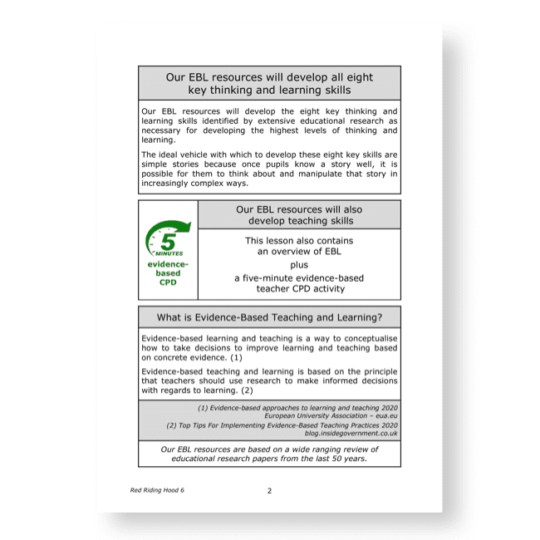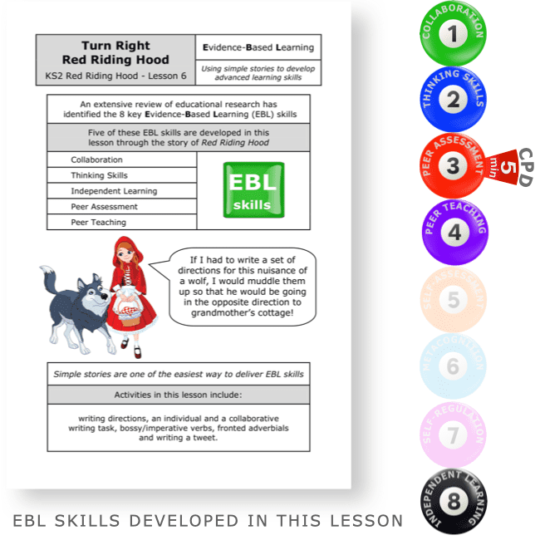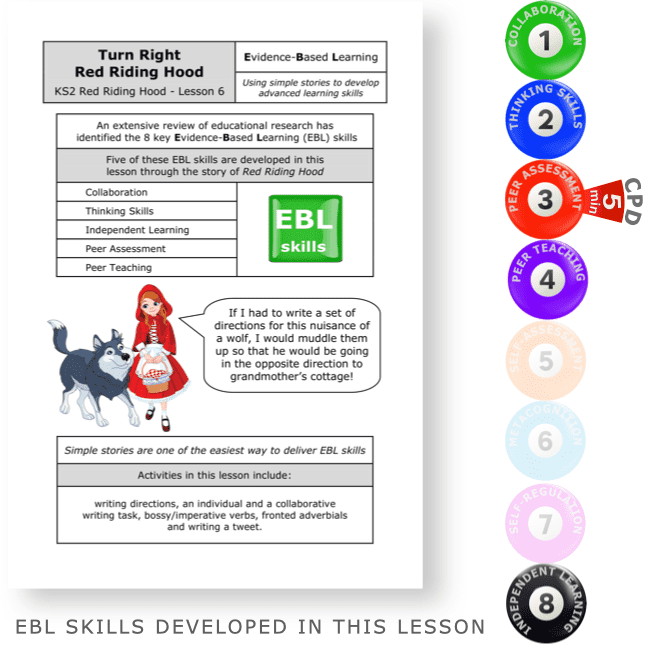Y6 First, Launch an Astronaut into Space
£3.00
KS2 National Curriculum:
✓ Planning writing using story structures (e.g., story mountain).
Activities in this lesson include learning about common plots for science fiction stories, completing a story mountain for a science fiction story, reading short extracts from science fiction stories, completing a task on each one and creating possible plots for science fiction stories.
There is a five-minute evidence-based CPD activity at the end of this lesson which will develop classroom teachers’ skill set. This CPD consists of a research extract on peer assessment with a five-minute activity based on this extract.
Description
These evidence-based learning (EBL) lessons are based on classroom practice that has been proven, by research, to maximise thinking, learning and attainment. From an extensive review of educational research, we identified the eight key classroom thinking and learning skills that were common across these research papers. We named these eight key skills “EBL skills”.
EBL skills have been proven by research to maximise learning because they combine the most productive thinking skills with the most effective learning behaviours. Each of our evidence-based learning lessons uses the English curriculum as a framework through which the eight EBL skills are delivered.
Teachers also have the opportunity to add to their own skill set or refresh their existing skills with our five-minute CPD activity, based on one of the EBL skills used in this lesson.
The skills in bold below are the EBL skills developed in this Science Fiction lesson. Click on each skill to learn more about that skill.
- Collaboration
- Thinking Skills
- Peer Assessment
- Peer Teaching
- Self-Assessment
- Metacognition
- Self-Regulation
- Independent Learning
1 review for Y6 First, Launch an Astronaut into Space
Only logged in customers who have purchased this product may leave a review.
Related products
-


Y5 All Characters Welcome
£3.00 Add to basket £3.00Add to basket
£3.00Add to basketKS2 National Curriculum:
✓ Describing characters; developing dialogue and consistency in character.
Activities in this lesson include learning about the need to be consistent when describing a character; looking at the four conventional ways of describing a character, identifying the characteristics of good and bad characters in science fiction stories and answering higher and lower order questions.
There is a five-minute evidence-based CPD activity at the end of this lesson which will develop classroom teachers’ skill set. This CPD consists of a research extract on self-regulation with a five-minute activity based on this extract.
VIEW -


Y6 The Intergalactic Guide to Paragraphs
£3.00 Add to basket £3.00Add to basket
£3.00Add to basketKS2 National Curriculum:
✓ Developing cohesion within paragraphs; using fronted adverbials.
A science fiction lesson with a range of activities that include structuring paragraphs, using fronted adverbials and writing paragraphs for a science fiction story.
There is a five-minute evidence-based CPD activity at the end of this lesson which will develop classroom teachers’ skill set. This CPD consists of a research extract on self-assessment with a five-minute activity based on this extract.
VIEW -


Turn Right Red Riding Hood
£3.00 Add to basket £3.00Add to basket
£3.00Add to basketActivities in this lesson include writing directions, an individual and a collaborative writing task, bossy/imperative verbs, fronted adverbials and writing a tweet.
There is a five-minute evidence-based CPD activity at the end of this lesson which will develop classroom teachers’ skill set. This CPD consists of a research extract on peer assessment with a five-minute activity based on this extract.
VIEW -


Y5 Home Sweet Dome
£3.00 Add to basket £3.00Add to basket
£3.00Add to basketKS2 National Curriculum:
✓ Describing settings; using expanded noun phrases and rich vocabulary.
This lesson looks at settings in a science fiction story in detail, and it includes answering higher and lower order questions on the settings of a science fiction story, reading extracts from science fiction stories and identifying the setting of these extracts.
There is a five-minute evidence-based CPD activity at the end of this lesson which will develop classroom teachers’ skill set. This CPD consists of a research extract on peer assessment with a five-minute activity based on this extract.
VIEW






Philipem (verified owner) –
We asked a.i. to review this lesson. This is what it said:
Title: Blast Off Literacy and Learning with this Plotting Sci-Fi Lesson “First, Launch an Astronaut into Space” Rating: ⭐⭐⭐⭐⭐
The “First, Launch an Astronaut into Space” resource is perfect for KS2 teachers looking to intertwine literacy teaching with evidence-based learning experiences. Through story plotting and analysis activities, pupils develop narrative comprehension while practising vital skills like peer assessment and metacognition.
Creating story mountains allows students to break down narrative structure and summarise key events. Inventing original sci-fi plotlines pushes their creative writing abilities. Evaluating sample extracts hones inference and predictive skills.
What makes this lesson truly out-of-this-world are the diverse evidence-based learning (EBL) opportunities woven in. Icons map how exercises target 5 key capabilities including independent learning, self-assessment, and thinking skills. The metacognitive reflection prompts higher-order cognition.
Just as valuable is the professional development support. The 5-minute CPD section succinctly reviews research on incorporating pupil feedback into peer assessment practices. This empowers an evidence-based teaching mindset.
Overall, I’d enthusiastically give “First, Launch an Astronaut into Space” a 5-star rating. It achieves an impeccable balance of advancing literacy objectives through collaborative, cognitive, and creative tasks – all aligned to EBL principles. The natural variety also accommodates different learning preferences beautifully.